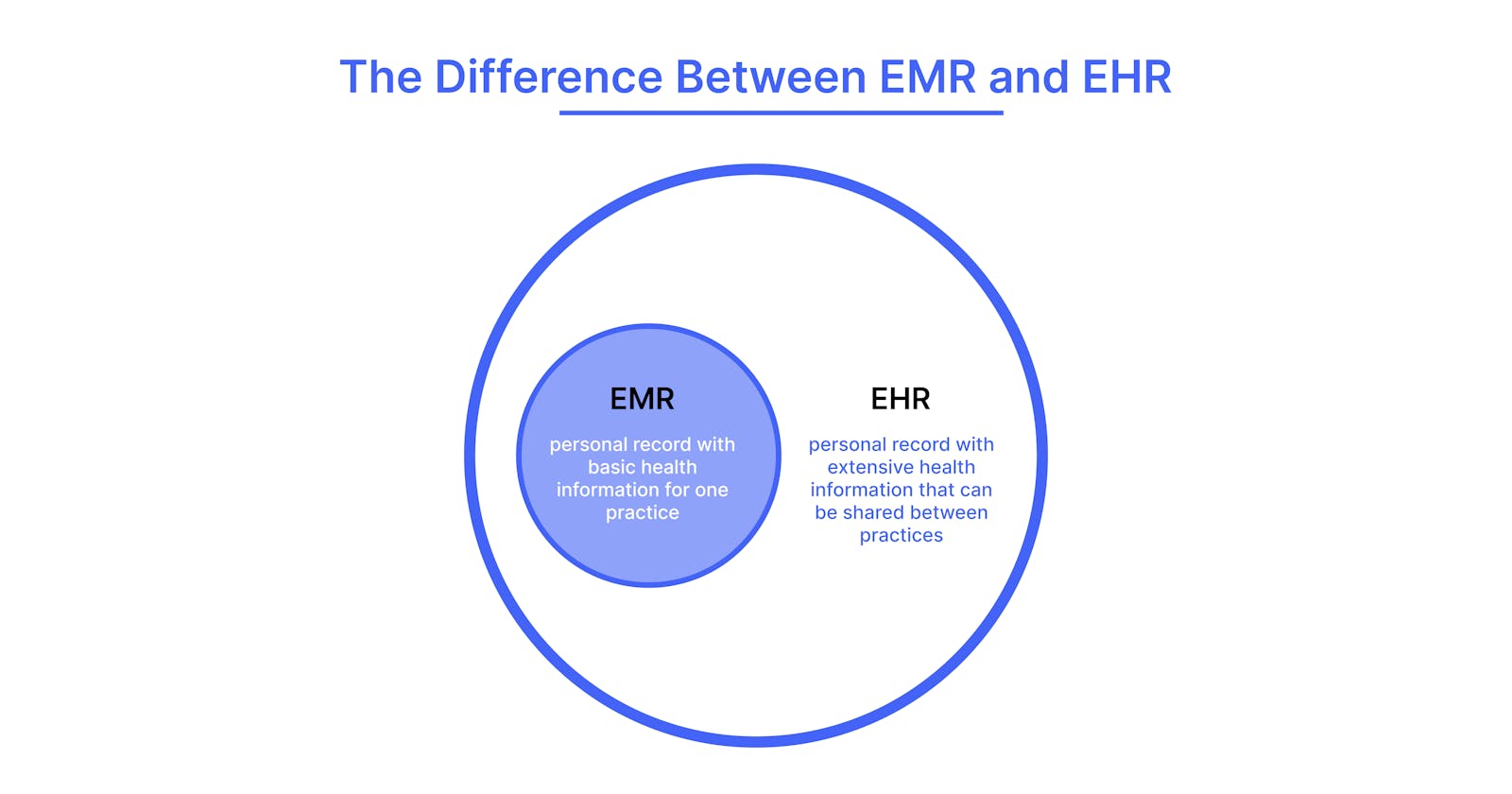Software development is one of the most well-known sectors of the economy today. There are several applications accessible, and whether we like it or not, cloud platforms and digital services will eventually permeate every element of our lives.
We utilize applications for several purposes, including recreation, sports, education, and learning. This is also true of the healthcare industry. It swiftly and seamlessly entered the app industry to offer top-notch healthcare services to both patients and medical professionals. The discomfort of waiting an hour in line for a quick visit with a doctor is no longer imposed upon people.
Electronic Medical Records (EMRs) and Electronic Health Records (EHRs) are important technical developments. Although EHR and EMR have different goals, they are commonly used interchangeably, making it important to know the distinctions between the two. But first, let's look at what EMR and EHR are before discussing their differences.
What does an EMR system in healthcare mean?
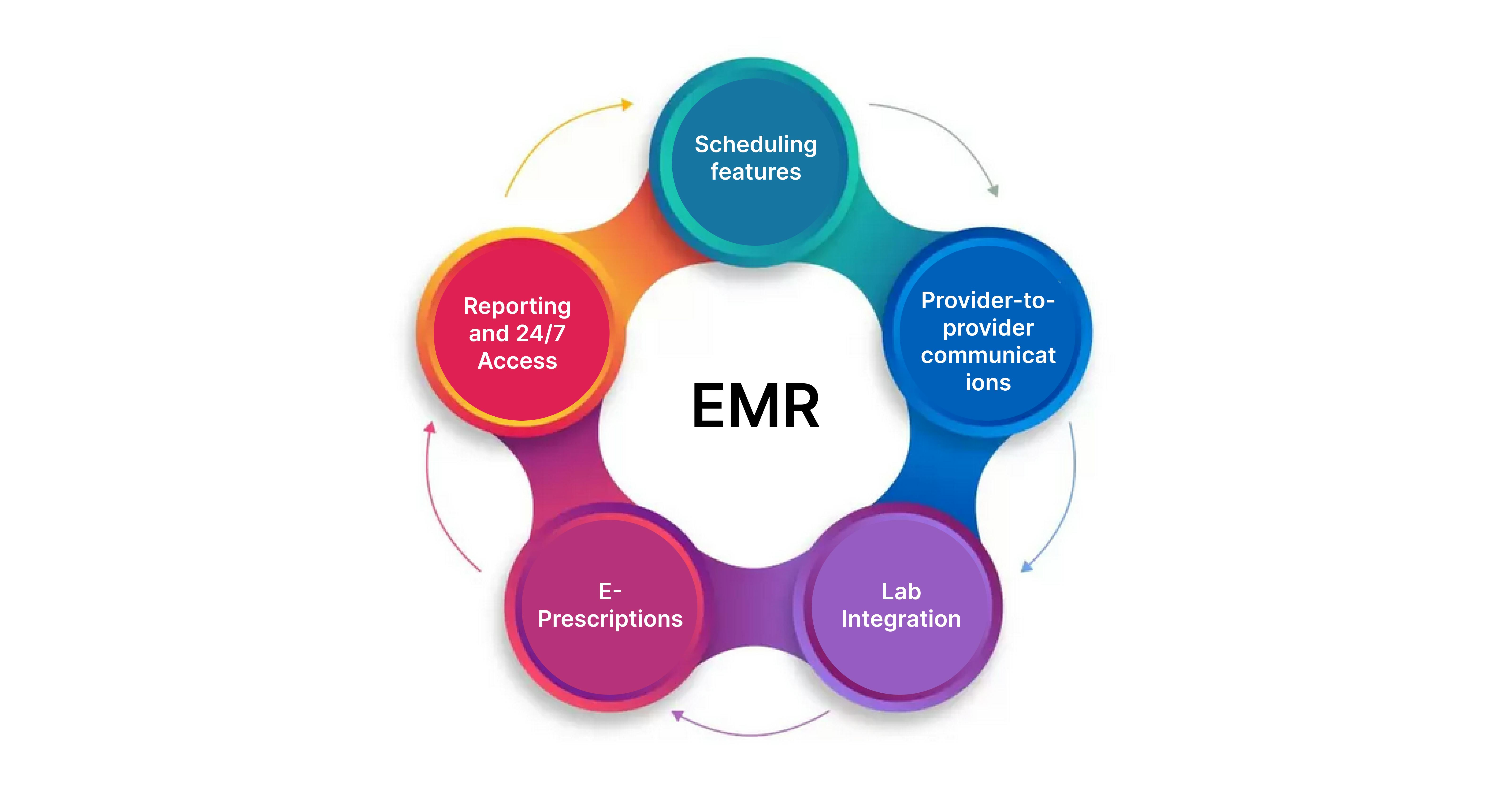
EMR is a cutting-edge idea that may be incredibly beneficial for both patients and medical practitioners. Traditional medical records have never been reliable, and it can be challenging to retain patient information without the use of technology. EMR has been used in several platforms and facilities, but what exactly is it, what are its advantages, and how does it work?
The term "Electronic Medical Records" (EMR) is an abbreviation. Electronic medical records are more than simply a stand-in for traditional medical records since they enable the best possible collaboration and communication between various departments and healthcare professionals.
Electronic medical records often include basic information about your health history, such as treatment details and earlier diagnoses that your doctor's office has noted. EMR systems in healthcare services provide a hub for doctor collaboration and care improvement.
In reality, they are progressively becoming a part of a new government regulation that is focused on the secure recording, keeping, and retrieval of patient histories. In the present decade, electronic medical records are becoming more and more prominent.
Benefits of EMRs
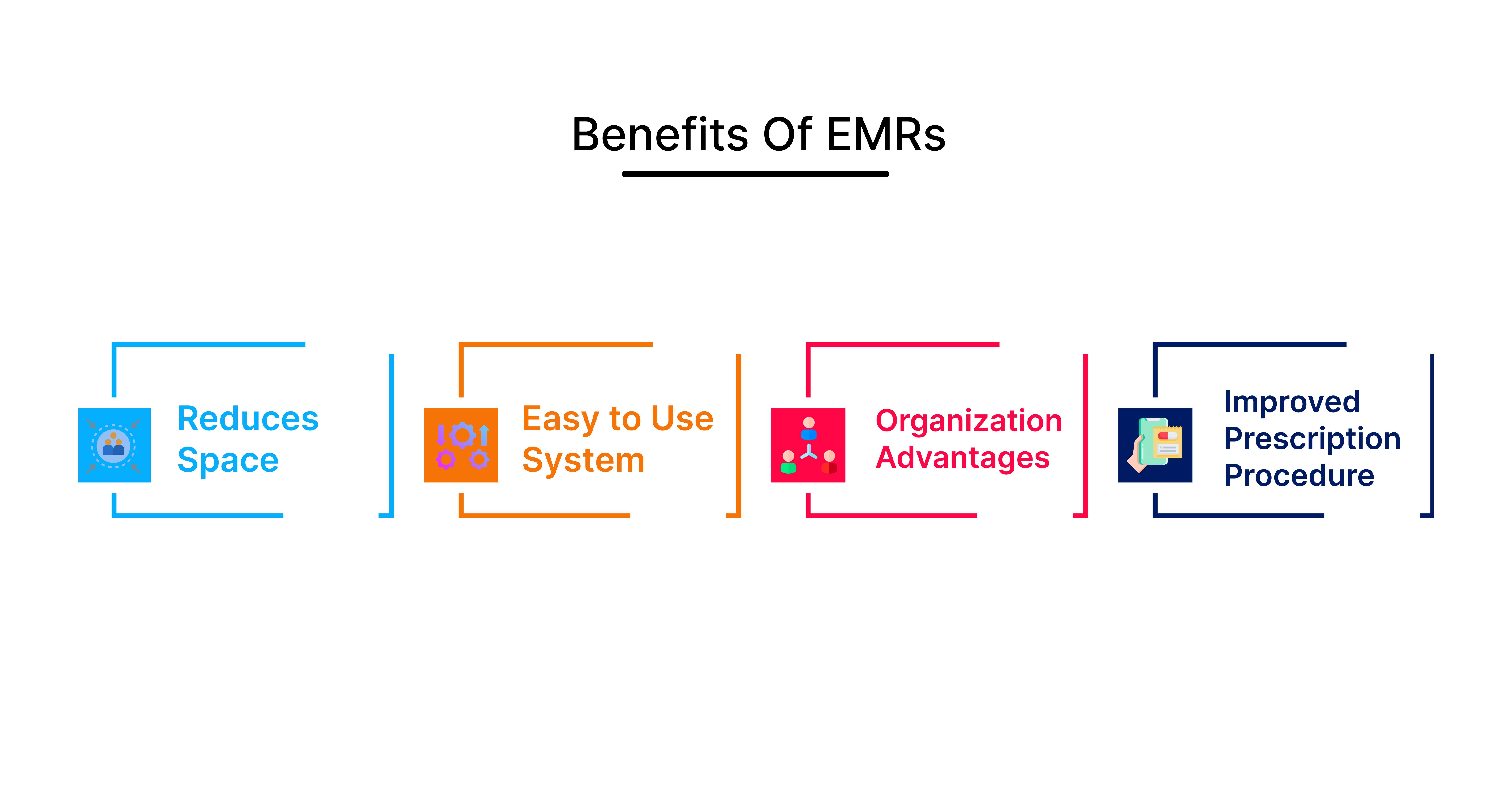
EMR systems in healthcare may benefit healthcare professionals and the health IT sector as a whole in several ways, and things today surely wouldn't be the same without their expanding implementation.
Reduces Space: Electronic medical records may assist save a lot of storage space when compared to traditional patient data, which would otherwise need to be physically stored someplace on-premises. Each doctor will undoubtedly experience an overall increase in the number of patients they treat annually in the modern world, where the population is always growing. Clinical documentation would rise along with the number of patients, something that could not have been achievable in the past without sufficient closet space.
Easy-to-use system: EMR also saves a significant amount of time by reducing the workload of healthcare providers by making it simple to quickly retrieve a patient's medical information. A healthcare worker would often have to seek a specific written record for several minutes. On the other hand, the systems that are used to store and maintain EMRs are incredibly user-friendly. The EMR system in hospitals may now be streamlined by securely keeping, storing, and arranging patient data so that a clinician just has to enter a patient's name or birth date to locate their information.
Organization Advantages: Since staff employees won't be required to extract data from mountains of paperwork, it is appropriate to state that adopting electronic medical records may also help to lessen the probability of Organizational issues and functional costs.
Improved Prescription Procedure: The much-needed filter that stops clinicians from proposing any treatment or medication that might have unfavorable side effects, such as bad reactions or hospitalisation, is a noteworthy benefit of electronic medical data.
What does EHR mean for healthcare?
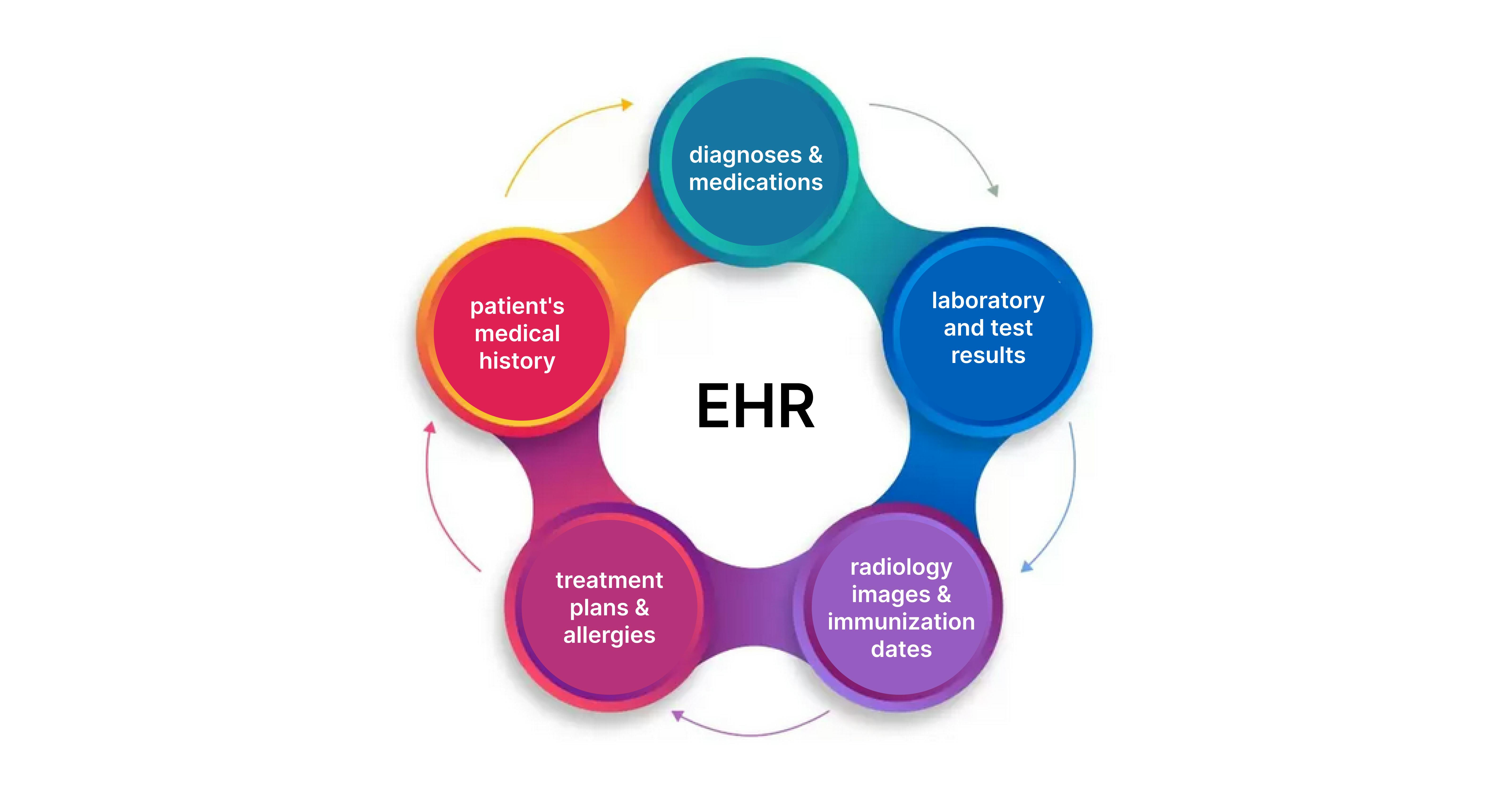
Electronic Health Records, or EHRs, are patient records that are kept electronically. Digital charts are increasingly being used by medical practitioners in place of the paper ones that are frequently placed at patients' bedsides. These real-time databases are designed to provide all the details on a patient, such as their conditions, health problems, and medicines.
People who are involved in patient care now have easy access to the information they require. Strong encryption is used in the development of EHRs, which are designed to be safely seen by only those with the proper authorization.
EHRs capture more information than the vast majority of doctor's offices and other medical data and information-collecting systems do. EHRs have been found to include patient medical histories and prior treatments.
They are designed to provide a far broader view of a patient's health and help medical practitioners compile the most important data so they may make knowledgeable decisions.
Benefits of EHRs
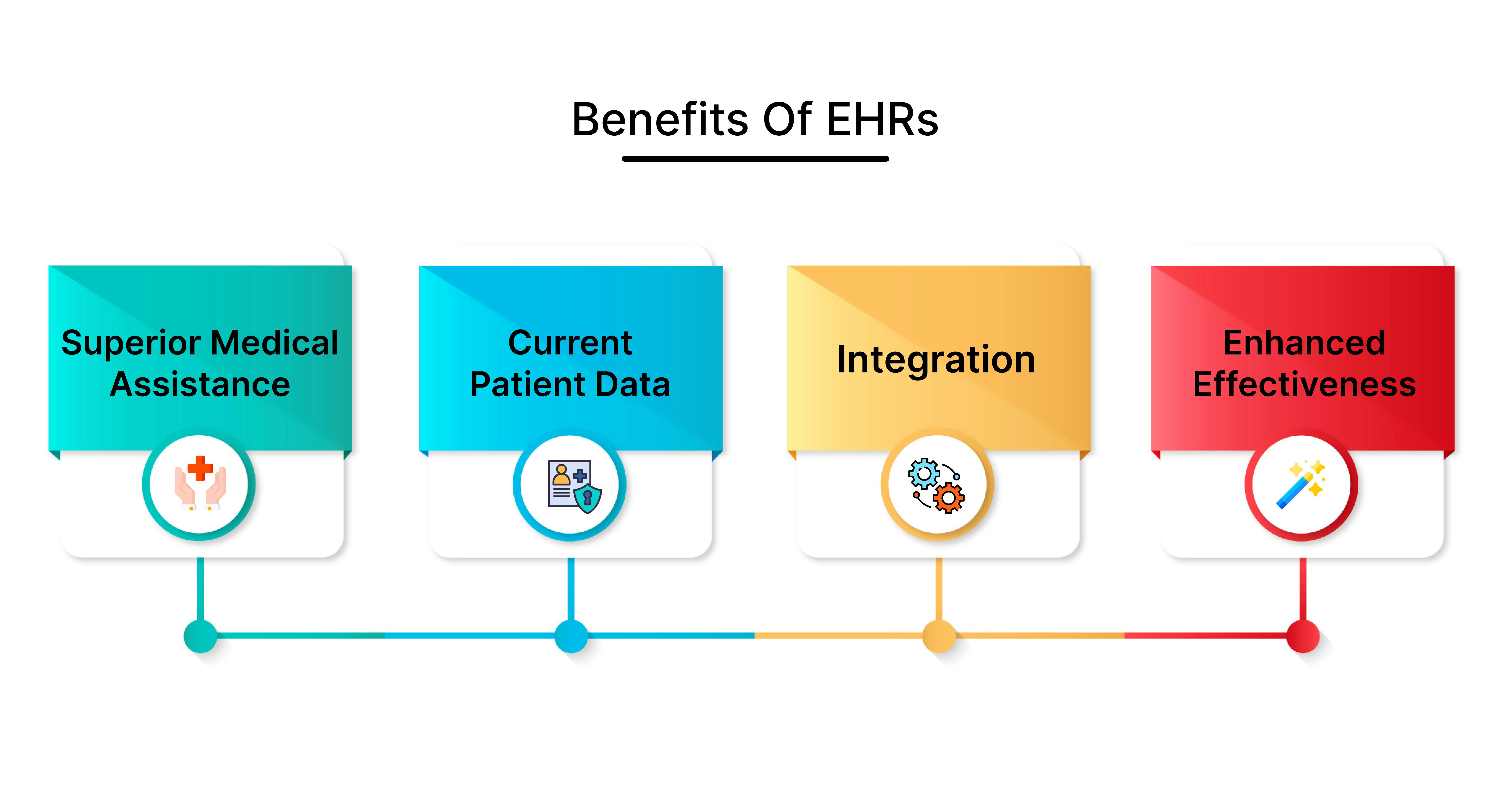
The value of knowing more information about a patient's health and background today is undeniable, but you might be interested in some more ways that EHRs might benefit your clinic and the patient. To allay your concerns, the benefits of EHRs are as follows:
Superior Medical Assistance: EHR makes it easier to obtain patient data more quickly, which improves care and aids in the delivery of high-quality care. They aid in the effectiveness of the doctor's care while also enhancing it. Patients also have access to healthcare information, which offers them access to historical medical information such as blood test results, radiological findings, prescriptions, diagnoses, and much more. By exchanging comments, texts, and even video conferences, patients and physicians may communicate. The portal enables monitoring of a patient's development during therapy by both doctors and patients. hence simplifying healthcare as a whole.
Current Patient Data: To make keeping and retrieving patient data easier, electronic files were first introduced to replace paper paperwork. However, they also provide several other advantages. Doctors can promptly change patient information to ensure that other healthcare practitioners have access to a thorough, current medical record. Through this online database, one may get in touch with any physician or consultant involved in a patient's treatment. EHR is very helpful since it provides doctors with a solid foundation of the patient's medical history, preventing them from having to start from scratch when a patient changes providers or sees a new specialist. EHR is a useful management tool that improves the accuracy of patient data as a result.
Integration: By connecting EHR with other systems, such as EMR, medical practitioners may improve care coordination. When patients need to see specialists, treat critical conditions like hypertension, or get ready to transition to home care for recovery or long-term care, an EHR system that enables connectivity is essential.
Enhanced Effectiveness: As was already said, EHR enables clinicians to provide faster, more accurate patient care. Because EHRs allow for speedier appointments and outpatient visits without sacrificing a patient-satisfaction approach, health practitioners see more patients every day. The intended themes in the EHR can be used by practitioners to document persistent patient pain or concerns. These designs are routinely changed to accommodate a doctor's needs or tailored to certain specialties.
What Sets the Two Apart (EMR and EHR)?
The current move to an online environment has resulted in significant advancements in EMR and EHR software. Leaders in the healthcare sector are increasingly using this technology to streamline their processes. It is vital to comprehend the differences between these two technologies as well as where they stand in terms of growth.
Many people are first confused by the differences between EMRs and EHRs. A patient's medical history can be found in their electronic medical records or EMRs. They allow for the monitoring of patient records, the notice of upcoming appointments or routine checks, and the tracking of patients throughout time.
Electronic health records, or EHRs, on the other hand, currently carry out each of these functions, as has already been mentioned, but go much beyond the minimal needs that EMRs are designed to fulfill. To ensure that the patient receives the finest treatment possible, wherever they go, they are designed to make it simpler for several healthcare providers, including family doctors, specialists, labs, and more, to transmit information.
This data may be transferred from one organization to another, ensuring that various providers aren't working with different sets of information and keeping some consistency in the course of the treatment.
EMR and EHR also differ in the following ways:
An EMR is a digital representation of a medical record, whereas an EHR has evolved into a digital record of all healthcare data.
Patient records from an EMR might still need to be printed since they are burdensome to take outside of the clinic. EHR technology, on the other hand, makes it possible for patients' medical records to accompany them to additional healthcare consultants and specialists.
Even though today's doctors predominantly utilize EMRs for diagnosis, treatment, and care, other medical professionals can use EHRs for decision-making, diagnosis, and care outside of a single doctor's office.
Which option should your healthcare business end up making?
Both EHR and EMR have their advantages and are important to the healthcare industry, as was mentioned in the context of EHR Vs EMR. To select the best EMR for hospitals or the finest medical EHR, you must first grasp how the two vary.
When implementing EHR software, it is now assumed that the system would be networked and linked to every possible point of care that a patient may access.
When compared to utilizing an EMR, adopting an EHR improves both patient satisfaction and the quality of healthcare services provided.
Electronic medical records (EMRs) are unquestionably superior to paper-based medical records, yet they only complete the information that is missing from paper records. On the other hand, all of the aforementioned characteristics and capabilities of EHRs improve the clinical experience of the patient.
Like picking any other technology, choosing medical software is a challenging and time-consuming procedure. However, getting feedback from staff members who will use the application is a great way to decide which tools and capabilities you'll need vs want. It's critical to consider the particular goals and specifications of the healthcare facility you manage.
If your healthcare firm must often communicate information with other healthcare professionals, using an EHR solution that has been certified is a sensible decision. If your medical practice routinely refers patients for exams or meetings with experts outside of your clinic, for instance, it is highly helpful for every patient to have an electronic health record.
An EMR, on the other hand, may be a simple and acceptable addition to the collection of information systems you now use to operate your medical facility if your practice is independent and entirely focused on treating a certain medical issue.
How can Remotestate assist you in making the best EMR/EHR decision for your healthcare organization?
Healthcare software is the backbone of the medical sector. This software streamlines the present administration, boosts productivity, and lowers healthcare expenses, acting as the catalyst for the healthcare revolution. Therefore, it is essential to invest in end-to-end software solutions.
Use Remotestate's healthcare software development services for cutting-edge disruption in preventative, prescriptive, and guarded healthcare. We recognize the value of developing tools and services that advance patient care, enable more extensive medical interventions, and provide innovative solutions.
Contact us today to receive a solution that is tailored to your facility's needs, improves patient happiness, and streamlines the administrative procedure.

